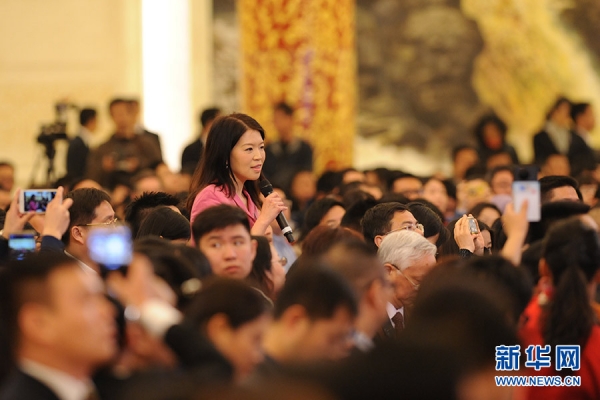Policy is to consolidate ties with Taiwan
Updated: 2016-03-17 07:57
By Zhu Songling(China Daily)
|
||||||||
 |
|
A reporter from Taiwan's CTI television asks a question during a press conference in Beijing, March 16, 2016. [Photo/Xinhua] |
At a press conference on Wednesday, Premier Li Keqiang again addressed the importance of 1992 Consensus, echoing top leader Xi Jinping's remarks earlier this month at a panel discussion on the significance of the consensus, which explicitly describe the nature of cross-Straits relations and are crucial to the long-term development of cross-Straits ties.
In his remarks made at the discussion with Shanghai delegation, Xi warned against the elements seeking "Taiwan independence", saying the tragedy of national secession will never be allowed.
Li, too, has said that the mainland will continue to adhere to the 1992 Consensus as the political foundation of cross-Straits ties and promote exchanges in diverse fields with Taiwan compatriots.
In fact, mainland leaders have been reiterating the importance of the 1992 Consensus for cross-Straits affairs. Apart from the historic 1992 Consensus, this time Xi also stressed the consistency and clarity of the mainland's cross-Straits policy, signaling a timely response to "the change in Taiwan's political situation".
Tsai Ing-wen, chairwoman of the Democratic Progressive Party, won the island's leadership election in January and is scheduled to take office in May. Yet she remains ambiguous about her stance on the 1992 Consensus, only expressing her wish to "maintain the status quo" in cross-Straits relations.
Over the past eight years, under the leadership of Kuomintang, Taiwan has seen an increasing number of benign exchanges with the mainland. That explains why some have expressed concern over whether the mainland would compromise its stance on the 1992 Consensus after the DPP assumes power.
- Preferential Taiwan business policies to remain unchanged
- China lodges representations on media reports of US arms sales to Taiwan
- Taiwan leader Ma Ying-jeou stresses importance of 1992 Consensus
- Taiwan policy pledge wins support
- President Xi warns against 'Taiwan independence' in any form
- Xi vows to curb Taiwan secessionists
- Cross-Straits ties at critical phase: Top Taiwan affairs official
- Global health entering new era: WHO chief
- Brazil's planning minister steps aside after recordings revelation
- Vietnam, US adopt joint statement on advancing comprehensive partnership
- European border closures 'inhumane': UN refugee agency
- Japan's foreign minister calls A-bombings extremely regrettable
- Fukushima impact unprecedented for oceans: US expert

 Stars of Lijiang River: Elderly brothers with white beards
Stars of Lijiang River: Elderly brothers with white beards
 Wealthy Chinese children paying money to learn British manners
Wealthy Chinese children paying money to learn British manners
 Military-style wedding: Fighter jets, grooms in dashing uniforms
Military-style wedding: Fighter jets, grooms in dashing uniforms
 Striking photos around the world: May 16 - May 22
Striking photos around the world: May 16 - May 22
 Robots help elderly in nursing home in east China
Robots help elderly in nursing home in east China
 Hanging in the air: Chongqing holds rescue drill
Hanging in the air: Chongqing holds rescue drill
 2.1-ton tofu finishes in two hours in central China
2.1-ton tofu finishes in two hours in central China
 Six things you may not know about Grain Buds
Six things you may not know about Grain Buds
Most Viewed
Editor's Picks

|

|

|

|

|

|
Today's Top News
Liang avoids jail in shooting death
China's finance minister addresses ratings downgrade
Duke alumni visit Chinese Embassy
Marriott unlikely to top Anbang offer for Starwood: Observers
Chinese biopharma debuts on Nasdaq
What ends Jeb Bush's White House hopes
Investigation for Nicolas's campaign
Will US-ASEAN meeting be good for region?
US Weekly

|

|







